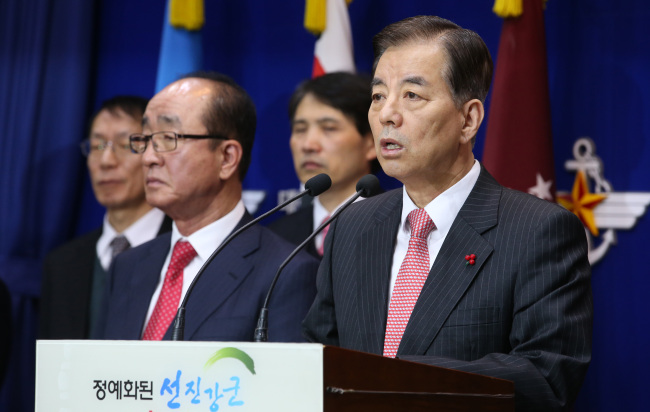A panel to reform the culture of the military recommended Thursday that the Defense Ministry consider simplifying enlisted soldiers’ ranking structure and enhancing the military judicial system and the screening process for draftees unfit for military service.
Wrapping up a four-month study, the panel also asked the ministry to allow conscripts to acquire academic credits from their military activities, and to receive extra points in recruitment exams at public organizations or firms after they are discharged.
These recommendations were some of the 22 tasks decided on by the panel to reform the military’s abusive culture and enhance the well-being of conscripts.
 |
Defense Minister Han Min-koo announces measures to reform culture in the military during a news conference on Thursday. (Yonhap) |
The panel was established in August following a series of abuse cases that resulted in deaths, suicides and even a shooting spree.
As for the simplification of the rank system, the panel noted that it would help improve the rigid hierarchical culture among conscripts. There are currently four ranks for the conscripts ranging from private to sergeant. The panel said reducing the number of ranks to two or three would help promote a sense of friendship among draftees.
The panel also suggested increasing the methods used to identify those unfit for military service and the number of military doctors responsible for the task. In Korea, all able-bodied men must serve in the military for at least 21 months.
As for the military judiciary system, the panel asked the ministry to abolish the practice of appointing a commissioned officer to join the court proceedings as a judge. An officer has so far been appointed as a judge ― in addition to professional judges ― on the grounds that handling military cases requires a deep understanding of the military organization and security.
However, the panel said that a military officer could be listed as part of the ruling staff in cases that concern top military secrets or require a high level of military knowledge.
To compensate for the time they spend serving the nation, a system to give extra points to those who have completed their service in recruitment exams needs to be introduced, the panel said. The panel recommended that the extra credit could be 2 percent or less of the total score.
But this recommendation triggered controversy as women and disabled people argue that the system will limit their employment opportunities, and that other “nondiscriminatory” welfare programs should be chosen to compensate draftees.
The system was ran from 1966 to 1999 to help those discharged from the military to adapt to civilian life. It was abolished after the Constitutional Court ruled that it infringed on the rights of women and disabled people.
The panel also recommended the introduction of an ombudsman under the direct control of the Prime Ministers’ Office to enhance human rights conditions for conscripts.
Some military officers had been against the system, arguing that the system would allow civilians access to all sites, which could undermine military security.
By Song Sang-ho (
sshluck@heraldcorp.com)





![[Herald Interview] 'Trump will use tariffs as first line of defense for American manufacturing'](http://res.heraldm.com/phpwas/restmb_idxmake.php?idx=644&simg=/content/image/2024/11/26/20241126050017_0.jpg)

![[Exclusive] Hyundai Mobis eyes closer ties with BYD](http://res.heraldm.com/phpwas/restmb_idxmake.php?idx=644&simg=/content/image/2024/11/25/20241125050044_0.jpg)
![[Herald Review] 'Gangnam B-Side' combines social realism with masterful suspense, performance](http://res.heraldm.com/phpwas/restmb_idxmake.php?idx=644&simg=/content/image/2024/11/25/20241125050072_0.jpg)